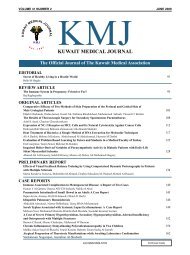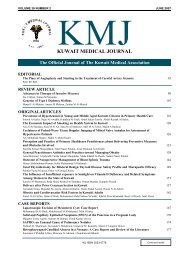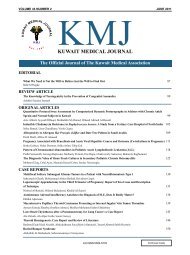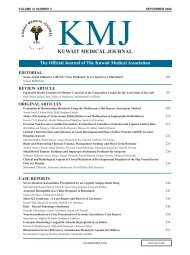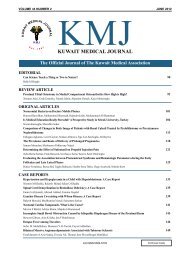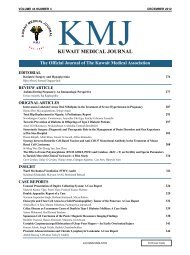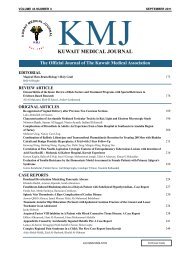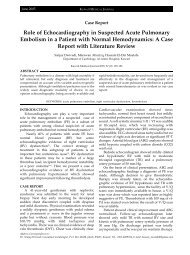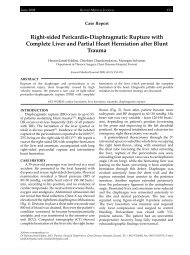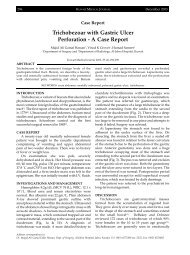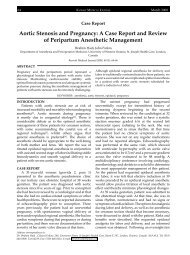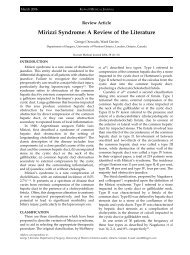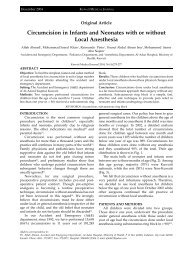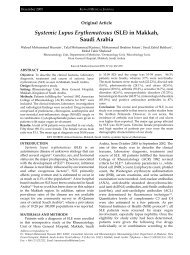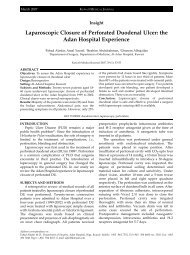Dietary Management of Hypertension
Dietary Management of Hypertension
Dietary Management of Hypertension
You also want an ePaper? Increase the reach of your titles
YUMPU automatically turns print PDFs into web optimized ePapers that Google loves.
March 2002<br />
rats (SD) given a high sucrose diet combined with<br />
low salt diet do not develop hypertension. High<br />
sucrose intake appears to elevate blood pressure<br />
only with normal or high dietary salt intake [20] .<br />
Sugar induced hypertension and insulin<br />
resistance in rats is related to the relative genetic<br />
sensitivity <strong>of</strong> the rat strain involved. Long term<br />
high sucrose diets elevate insulin and blood<br />
p re s s u re most dramatically in SHR, with an<br />
intermediate response in WKY rats and moderate<br />
elevation in Wistar rats [16,21] .A fructose enriched diet<br />
increases plasma triglycerides, insulin and blood<br />
p re s s u re in both WKY and SHR rats but the<br />
magnitude <strong>of</strong> these changes is much greater in the<br />
genetically sensitive SHR [22] .<br />
Increased Cardiovascular Risk with High Sugar<br />
Diet in Humans<br />
American consumption <strong>of</strong> “added” sugars has<br />
risen dramatically in recent years, from 13% <strong>of</strong><br />
calories in 1989 to 16% in 1996 [23] . Estimations from<br />
food disappearance data indicate that the level <strong>of</strong><br />
sucrose in the American diet is 15-21% <strong>of</strong> total<br />
calories or about 10% fructose [18,24] . High fructose<br />
sweetening in s<strong>of</strong>t drinks accounts for almost half<br />
<strong>of</strong> the total added sugars in the U.S. diet and<br />
consumption <strong>of</strong> s<strong>of</strong>t drinks has incre a s e d<br />
dramatically in recent years, particularly among<br />
adolescents [23] . Fructose accounts for 50% <strong>of</strong> the<br />
calories <strong>of</strong> s<strong>of</strong>t drinks [25] .<br />
In animal models, it has been clearly shown that<br />
a high sugar diet can produce both hyperlipidemia<br />
and elevated blood pre s s u re, the two major<br />
coronary heart disease risk factors. There is also<br />
considerable evidence to show that humans<br />
consuming a high sugar diet are at increased risk <strong>of</strong><br />
cardiovascular disease. Early evidence came from<br />
a study <strong>of</strong> Israeli Yemenites. Yemenites living in<br />
Israel 25 years or more have a significant increase in<br />
the incidence <strong>of</strong> athero s c l e rosis, ischemic heart<br />
disease and diabetes compared to recent Yemen<br />
immigrants. One <strong>of</strong> the major difference in the diet<br />
consumed in Yemen and that in Israel is that<br />
carbohydrates consumed in the Yemen consisted<br />
solely <strong>of</strong> starches with almost no sugar while in<br />
Israel, sucrose accounted for 25 to 30% <strong>of</strong> total<br />
c a r b o h y d r a t e s [ 2 6 ] . Using market consumption <strong>of</strong><br />
foods in a multinational study, Grant showed a<br />
relationship between the fraction <strong>of</strong> the diet<br />
derived from simple sugars and ischemic heart<br />
disease mortality rates [ 2 7 ] . Sweeteners are<br />
particularly highly associated with ischemic heart<br />
disease mortality for women between the ages <strong>of</strong> 35<br />
and 64 years [28] .<br />
Nikkila has suggested that dietary sucrose is<br />
one <strong>of</strong> the factors responsible for increased obesity,<br />
diabetes and heart disease in the U.S [ 2 9 ] .<br />
KUWAIT MEDICAL JOURNAL 3<br />
U n d o u b t e d l y, the fructose component <strong>of</strong> the<br />
sucrose molecule is the major cause <strong>of</strong> sucroseinduced<br />
insulin resistance. Healthy adult males<br />
given a diet high in fructose for just 1 week<br />
developed a significant reduction in both insulin<br />
binding and insulin sensitivity [30] .<br />
A diet high in carbohydrate is not, in itself, a risk<br />
factor. Epidemiological studies provide abundant<br />
evidence that, in rice-eating populations <strong>of</strong> the<br />
world, hypertriglyeridemia is rare [ 3 1 ] . Healthy<br />
subjects show significantly increased triglycerides<br />
and VLDL after intake <strong>of</strong> a high sucrose or high<br />
fructose diet but show no adverse changes on a<br />
c o r responding high starch diet [ 3 2 , 3 3 ] . <strong>Dietary</strong><br />
carbohydrate as starch actually impro v e d<br />
triglyceride levels in patients with elevated levels<br />
while dietary sugar exacerbated the condition [31] .<br />
Adults age 35 - 55 years consumed two diets for 6<br />
weeks in cross-over design containing either 30% <strong>of</strong><br />
calories as sucrose or wheat starch. Sucrose feeding<br />
p roduced an increase in serum insulin,<br />
insulin/glucose ratio and insulin response to<br />
sucrose load compared to starch [5] .<br />
Persons with a genetic susceptibility towards<br />
impaired glucose metabolism will be particularly<br />
sensitive to the adverse effects <strong>of</strong> a high sucrose or<br />
high fructose diet. Adverse responses to high<br />
sucrose diet have been shown to be <strong>of</strong> greater<br />
magnitude in carbohydrate-sensitive subjects [ 5 ] .<br />
Carbohydrate sensitive adults given a high sucrose<br />
diet develop significantly elevated plasma<br />
cholesterol, LDL, triglycerides and blood pressure<br />
after 5 to 6 weeks [6,7] .<br />
SALT-INDUCED HYPERTENSION<br />
Sucrose and sodium are common constituents in<br />
the diet <strong>of</strong> modern society. Much evidence has<br />
accumulated and appears irrefutable that excess<br />
sodium can contribute to the development <strong>of</strong><br />
hypertension and heart disease. Sodium-dependent<br />
hypertension has been documented in well<br />
c o n t rolled animal and human investigations [ 2 ] .<br />
Yanomamo Indians and Xingu <strong>of</strong> Northern Brazil,<br />
who do not eat salt, have no hypertension, nor does<br />
their blood pressure rise with age, as it does with all<br />
accultured populations [34,35] . Since almost everyone<br />
in western countries ingests a high sodium diet, the<br />
fact that only about half will develop hypertension<br />
suggests a variable degree <strong>of</strong> sensitivity to sodium.<br />
O b v i o u s l y, both heredity and interaction with<br />
environmental factors are involved.<br />
The term “salt sensitivity” implies that some<br />
individuals respond to a high salt intake with an<br />
increase in blood pressure and others (salt resistant<br />
individuals) do not. Fifty-one percent <strong>of</strong><br />
hypertensives and only 26% <strong>of</strong> normotensives are<br />
salt-sensitive. Patients with essential hypertension



